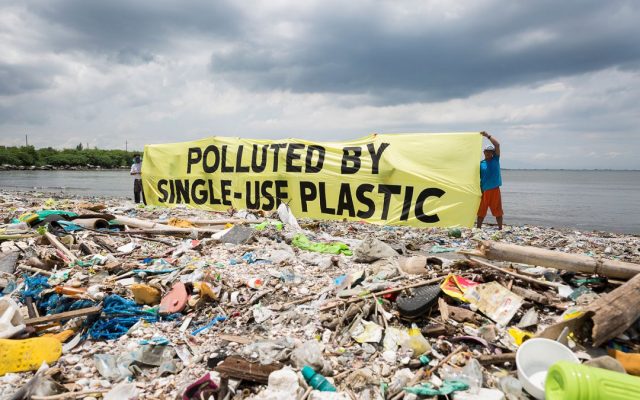
The Climate and Sustainable Development Network (CSDevNet), an NGO, has called on the Federal Government to ban the production and utilisation of single-use plastics in the country.
Mr Atayi Babs, the National Coordinator of the Network made the call in a statement e-mailed to News Agency of Nigeria (NAN) on Tuesday in Abuja.
Babs said that in line with the objectives of the 2018 World Environment Day, which had “Beating Plastic Pollution” as its theme, the Federal Government should map out strategies for the evolution of plastic pollution-free environment in Nigeria.
“CSDevNet, in collaboration with partners and other non-state actors, want the government to go beyond rhetoric and mere sloganeering to set in motion the process of banning single-use plastics in Nigeria.
“The 2018 World Environment Day presents a veritable opportunity for us to consider how we can make changes in our everyday lives to reduce the heavy burden of plastic pollution on humans and the environment.
“In spite of the fact that plastics have many valuable uses, Nigeria has become over-reliant on single-use or disposable plastic materials; with severe consequences on the environment,’’ he said.
Babs said that CSDevNet had recognised the fact that overcoming plastic pollution was a huge challenge, particularly if one considered the current culture of disposable economy existing in the country.
“Fifty per cent of plastics in use are of the disposable or single-use type. Globally, we buy one million plastic bottles every minute and use up to 5 trillion plastic bags every year.
“Dumping plastic bottles, bags and cups after a single use is projected to result in our oceans holding more litter than fish by 2050, while an estimated 99 per cent of all seabirds will have ingested plastics.
“There is even evidence that plastic waste threatens soil fertility. Reports by Ocean Conservancy suggest that there will be more plastics than fish in oceans by 2050,’’ he said.
Babs said that already, plastics had been found in over 60 per cent of all seabirds and in all sea turtle species that mistook plastics for food.
“We must, however, beat plastics — for our survival and for the survival of other species. We need fish, not plastics,’’ he added.
The ecologist stressed that FG had a major role to play in the campaign to overcome plastic pollution by addressing the current scourge of plastic waste on urban and rural landscapes across the country.
“Across Africa, several African countries including, Cote d’Ivoire, Cameroon, Mauritania, Tunisia, Kenya, Uganda Rwanda, Tanzania, Morocco, South Africa have enacted laws relating to the ban on the use, manufacture and importation of single-use plastic bags.
“In view of the fact that outright bans on single-use plastics without viable and affordable alternatives such as biodegradables or paper-based alternatives, which are often perceived as more expensive and less durable, could negatively affect some sections of the society as well as small and medium-size enterprises.
“We urge the Nigerian authorities to introduce the plastic bag levy, which is favoured in several countries across the globe, including the United Kingdom, and such measures have significant success in relation to inducing behavioural change towards single-use plastics.
“In some countries such as South Africa, it has been reported that funds raised from the plastic bag levies are not only used in investing in recycling programmes but also in programmes that will bring about fundamental behavioural changes — both at the individual or the corporate level — towards beating plastic pollution for good.
“The funds are also channelled towards creating empowerment opportunities for the teeming young population,’’ he said
Babs said: “We believe Nigeria can toe this line by providing incentives such as tax breaks for companies to encourage plastics recycling.
“The companies can also be encouraged to transform their production processes towards the manufacture of biodegradable alternatives.
“Legislation should be made as part of a holistic programme for sustainably transforming the economy and prohibiting all non-biodegradable plastics from the country.
“In line with the proposals, we call on the Presidency, through the Federal Ministry of Environment, to initiate steps aimed at regulating the manufacture, use and disposal of single-use plastics in Nigeria.
“CSDevNet, hereby, commits itself to collaborating with the National Assembly Committees on Environment, Habitat and Climate Change and other relevant non-state actors in the aggregated efforts at crafting an institutional framework to tackle the menace of plastic pollution in the country,’’ he said. (NAN)
Culled from News Agency of Nigeria (NAN)
